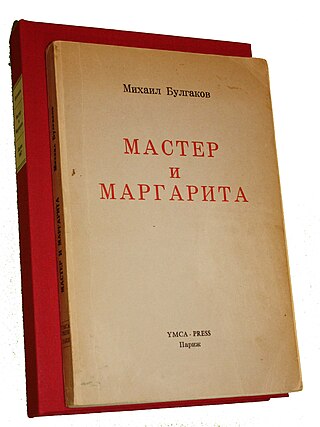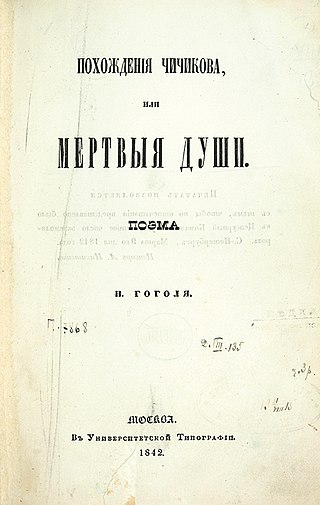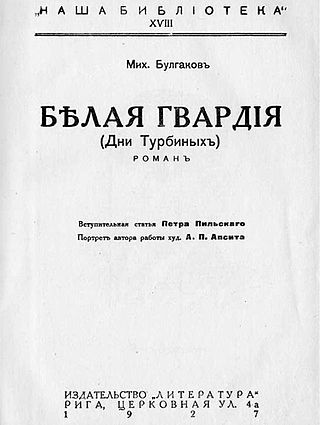
Yevgeny Ivanovich Zamyatin, sometimes anglicized as Eugene Zamyatin, was a Russian author of science fiction, philosophy, literary criticism, and political satire.

Mikhail Afanasyevich Bulgakov was a Russian, later Soviet writer, medical doctor, and playwright active in the first half of the 20th century. He is best known for his novel The Master and Margarita, published posthumously, which has been called one of the masterpieces of the 20th century.

We is a dystopian novel by Russian writer Yevgeny Zamyatin, written in 1920–1921. It was first published as an English translation by Gregory Zilboorg in 1924 by E. P. Dutton in New York, with the original Russian text first published in 1952. The novel describes a world of harmony and conformity within a united totalitarian state. It influenced the emergence of dystopia as a literary genre. George Orwell said that Aldous Huxley's 1931 Brave New World must be partly derived from We, although Huxley denied this. Orwell's own Nineteen Eighty-Four (1949) was also inspired by We.

The Master and Margarita is a novel by Soviet writer Mikhail Bulgakov, written in the Soviet Union between 1928 and 1940. A censored version, with several chapters cut by editors, was published in Moscow magazine in 1966–1967, after the writer's death, by his widow Elena Bulgakova. The manuscript was not published as a book until 1967, in Paris. A samizdat version circulated that included parts cut out by official censors, and these were incorporated in a 1969 version published in Frankfurt. The novel has since been published in several languages and editions.

Andrei Platonovich Platonov was a Soviet Russian novelist, short story writer, philosopher, playwright, and poet. Although Platonov regarded himself as a communist, his principal works remained unpublished in his lifetime because of their skeptical attitude toward collectivization of agriculture (1929–1940) and other Stalinist policies, as well as for their experimental, avant-garde form infused with existentialism. His famous works include the novels Chevengur (1928) and The Foundation Pit (1930).

Dead Souls is a novel by Nikolai Gogol, first published in 1842, and widely regarded as an exemplar of 19th-century Russian literature. The novel chronicles the travels and adventures of Pavel Ivanovich Chichikov and the people whom he encounters. These people typify the Russian middle aristocracy of the time. Gogol himself saw his work as an "epic poem in prose", and within the book characterised it as a "novel in verse". Gogol intended the novel to be the first part of a three-volume work, but burned the manuscript of the second part shortly before his death. Although the novel ends in mid-sentence, it is regarded by some as complete in the extant form.

Boris Nikolaevich Bugaev, better known by the pen name Andrei Bely or Biely, was a Russian novelist, Symbolist poet, theorist and literary critic. He was a committed anthroposophist and follower of Rudolf Steiner. His novel Petersburg (1913/1922) was regarded by Vladimir Nabokov as the third-greatest masterpiece of modernist literature. The Andrei Bely Prize, one of the most important prizes in Russian literature, was named after him. His poems were set to music and performed by Russian singer-songwriters.

The White Guard is a novel by Mikhail Bulgakov, first published in 1925 in literary journal Rossiya. It was not reprinted in the Soviet Union until 1966.
This is a bibliography of Aleksandr Solzhenitsyn's works.
Michael Valentine Guybon Glenny was a British lecturer in Russian studies and a translator of Russian literature into English.

Yury Osipovich Dombrovsky was a Russian writer who spent nearly eighteen years in Soviet prison camps and exile.

Fyodor Sologub was a Russian Symbolist poet, novelist, translator, playwright and essayist. He was the first writer to introduce the morbid, pessimistic elements characteristic of European fin de siècle literature and philosophy into Russian prose.
The Fatal Eggs is a novella by Mikhail Bulgakov, a Soviet novelist and playwright. It was written in 1924 and first published in 1925. The novel became quite popular, but was much criticised by most Soviet critics as a mockery of the Russian Revolution of 1917 and the leadership of Soviet Russia.

Ardis Publishing began in 1971, as the only publishing house outside of Russia dedicated to Russian literature in both English and Russian, Ardis was founded in Ann Arbor, Michigan by husband and wife scholars Carl R. Proffer and Ellendea C. Proffer. The Proffers had two goals for Ardis: one was to publish in Russian the "lost library" of twentieth-century Russian literature which had been censored and removed from Soviet libraries ; the other was to bring translations of contemporary writers working in the Soviet Union to the West. Ardis has published around 400 titles, roughly half in English, half in Russian.
Ellendea Proffer Teasley is an American author, publisher, and translator of Russian literature into English.

Theatrical Novel, translated as Black Snow and A Dead Man's Memoir (Russian: Театральный роман, romanized: Teatralnyy roman is an unfinished novel by Mikhail Bulgakov. Written in first-person, on behalf of a writer Sergei Maksudov, the novel tells of the drama behind-the-scenes of a theatre production and the Soviet writers' world.

A Young Doctor's Notebook, also known as A Country Doctor's Notebook, is a short story cycle by the Russian writer Mikhail Bulgakov. The stories written in 1925–1926 and inspired by Bulgakov's experiences as a newly graduated young doctor in 1916-18, practicing in a small village hospital in Smolensk Governorate in revolutionary Russia. The stories initially appeared in Russian medical journals of the period and were later compiled by scholars into book form.

The Bulgakov House is situated on the ground floor of Bolshaya Sadovaya ulitsa no. 10 in Moscow, in the building where the Soviet writer Mikhail Bulgakov used to live, and in which some major scenes of his novel The Master and Margarita are set. The museum was established as a private initiative on May 15, 2004.
Taking Stock is a 1970 novel by Yury Trifonov. It is the second volume of his Moscow quintet.
The Long Good-Bye is a 1971 novel by Yury Trifonov. It is the third of five volumes in his Moscow cycle.